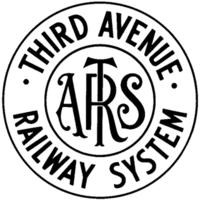Third Avenue Railway System
 |
|

Third Avenue car operated at the Seashore Trolley Museum, Kennebunkport, Maine.
|
|
| Dates of operation | 1853–1956 |
|---|---|
| Predecessor | Third Avenue Railroad Company |
| Successor | New York City Omnibus Corporation |
| Track gauge | 4 ft 8 1⁄2 in (1,435 mm) |
| Electrification | 600v DC |
| Headquarters | New York, New York |
The Third Avenue Railway System (TARS), founded 1852, was a streetcar system serving the New York City boroughs of Manhattan and the Bronx along with lower Westchester County. For a brief period of time, TARS also operated the Steinway Lines in Long Island City.
The conversion from streetcar to bus operation came from great pressure applied by New York City's Board of Transportation for a unified bus transportation system across the city. TARS applied for its first bus franchises in 1928. By 1948, all streetcar lines in Manhattan and The Bronx were converted to bus operation. The lines in Westchester County continued to operate, until the Yonkers city lines were shut down in 1952. Third Avenue Railway was purchased by New York City Omnibus Corporation in 1956, and transferred the remaining transit operating franchises to subsidiary Surface Transportation, Inc.
The origins of the Third Avenue Railway System can be traced back to a simple horsecar line operated by the Third Avenue Railroad Company between City Hall and 62nd Street in Manhattan in 1853. By the 1870s, routes had been extended as far north as 129th Street and across the length of 125th Street. At its peak, more than 1700 horses were stabled by the railway to keep up with demand. By 1885, Third Avenue Railroad had opened its first cable car line on Amsterdam Avenue. The 125th Street and Third Avenue lines were converted to cable car operation by 1893. The lines were converted to electric operation in 1899. Because of a ban on overhead trolley wires in Manhattan, streetcars collected power from a conduit in between the rails, by means of a plow, a method also used in Washington, D.C. and London. Some cars were equipped with trolley poles for operation on lines outside Manhattan into the Bronx. In many cases the conduit was run in the former channel occupied by the propulsion cable.
...
Wikipedia
